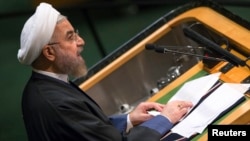Iran's president is placing heavy blame on Western countries for the rise of extremism in the Middle East, citing colonialism and what he called "strategic blunders."
Hassan Rouhani told the United Nations General Assembly on Thursday that "moderate politicians and elites" in the region must provide the leadership to counter violence and terrorism.
"The right solution to this quandary comes from within the region, and from a regionally provided solution with international support," Rouhani said, "and not from the outside the region."
Rouhani has been critical of the U.S.-led campaign against the Islamic State group that began with airstrikes in Iraq last month, saying a military approach is not the way to stop the militants.
In a rare move, however, Iran's top diplomat will meet with U.S. and European Union foreign policy chiefs in New York later Thursday.
A senior U.S. official tells VOA that Secretary of State John Kerry will join the EU's Catherine Ashton and Iranian Foreign Minister Mohammad Zarif on the sidelines of the U.N. General Assembly "to take stock of the work that has been done this week and discuss the path forward."
President Rouhani also vowed on Thursday that Iran would continue its nuclear program, long a point of contention with diplomatic foes like the United States.
Iran and six world powers - the United States, Britain, France, Russia, China and Germany - have been holding talks about what concessions Tehran must make on its nuclear program in exchange for a continued reduction in sanctions.
Iran has said it is committed to reaching a nuclear deal. But analysts say the chances for a breakthrough are slim ahead of the November 24 deadline that was set after the two sides failed to reach a July target date for a deal.
The two sides reached an interim deal last year to reduce U.S. sanctions in exchange for Iran freezing its uranium enrichment program.
Iran is pushing to preserve its ability to enrich uranium, which it says is to help generate electricity. The U.S. and many of its allies fear Iran is trying to achieve the capability of producing a nuclear bomb.
VOA's Scott Stearns contributed to this report. Some information was provided by AP and AFP.





